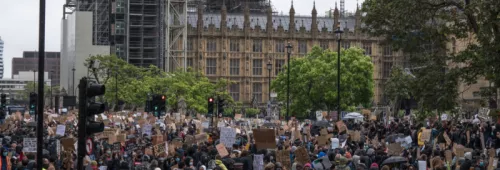The Racial Justice Advocacy Forum calls for the Church to practically engage with racial justice efforts despite the denial of institutional racism - a conclusion drawn from the Commission on Race and Ethnic Disparities Report (2021)
The Racial Justice Advocacy Forum (RJAF) has produced a document that seeks to give practical guidance to churches in Britain in response to the Commission on Race and Ethnic Disparities report, sometimes referred to as “The Sewell Report” after commission chair Tony Sewell. It is felt that the report’s denial of institutional racism poses serious implications for the Church and its pursuit of racial justice in both Church and wider society.
“Although there are some helpful recommendations in the Sewell Report, the report’s denial of institutional racism does not reflect the lived experiences of many Black and Brown people. Institutional racism has impacted the lives of far too many Black and Brown people. It is a matter that needs to be addressed with some urgency, not denied.” (Revd. Wale Hudson-Roberts, Justice Enabler, BUGB)
Key Points of the RJAF Report
Other Christian entities such as the National Church Leaders Forum (NCLF) have offered considered responses to the Sewell Report, challenging its intent, rigour, method, and interpretation. The RJAF acknowledges and welcomes these reflections. Despite the Sewell Report’s optimism and distancing from contemporary injustices such as the Windrush scandal, the RJAF poses several suggestions for the Church in response to the report’s recommendations. Notwithstanding the Sewell Report’s denial of institutional racism in wider society, the RJAF challenges churches in Britain on their own complicity as religious institutions.
“Is our service to one another and the wider community affected by the discrimination and prejudice that impact the ability of a person to thrive in leadership, counselling, teaching, discipleship or liturgy?” (Eleasah Louis, RJAF Report, 2021)
- The RJAF report suggests that churches engage in their own research, both locally and denominationally, so that the Church can contribute to understanding the inner workings and experiences of the various ethnic groups in Britain, the role that Christianity plays in their life choices, and what shapes the nuances of their lived experiences.
- The RJAF report recommends that churches develop more rigorous theological responses to racial injustices and consider racial justice training for leaders and church members that will equip them to interpret, preach, teach, and serve their communities in consideration of these issues.
- The RJAF report proposes that churches create processes for challenging racial discrimination in churches and Christian institutions, including procedures for mediation and reprimand.
- The RJAF calls for a broadening of the Christian educational curriculum to utilise the alternative theological imaginations found amongst those belonging to Christian British ethnic minority communities.
The Racial Justice Advocacy Forum
The Racial Justice Advocacy Forum is an ecumenical Christian entity comprised of representatives from various Christian institutions such as the Ascension Trust, the Baptist Union of Great Britain, Churches Together in Britain and Ireland, the Evangelical Alliance, the Methodist Church, the Religious Society of Friends (Quakers), The Salvation Army, the Sam Sharpe Project, and the United Reformed Church.
The RJAF seeks to speak prophetically to government on racial injustice challenges and reparations. It aims to resource and mobilise Black, Brown and Ethnic Minority Christians to take action to address racial injustice in society and, where necessary, to advocate on behalf of Black, Brown and Ethnic Minority communities on racial justice matters. At its heart, this advocacy requires Black, Brown and Ethnic Minority Christians to influence both public attitudes and public policies so that, in this context, a racially just vision of the Church and society becomes a living reality.
For more information, press only:
Revd. Wale Hudson-Roberts
Justice Enabler
Baptist Union of Great Britain
Email: [email protected]
Richard Reddie
Director of Justice and Inclusion
Churches Together in Britain and Ireland
Email: [email protected]

